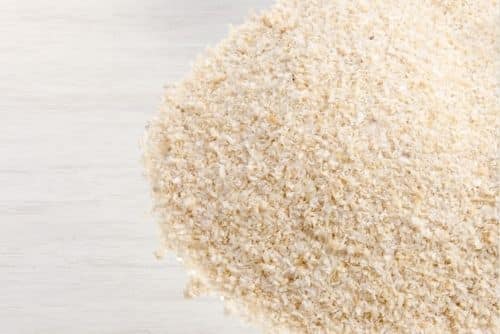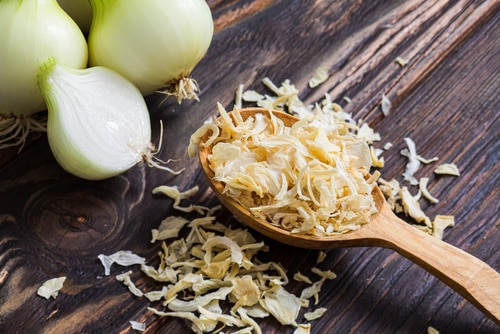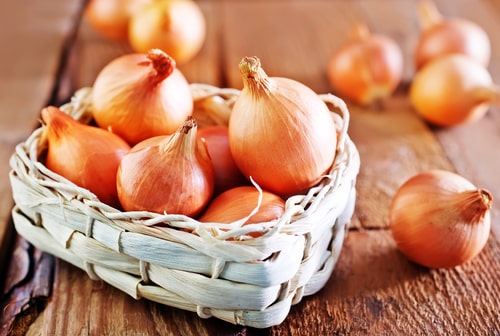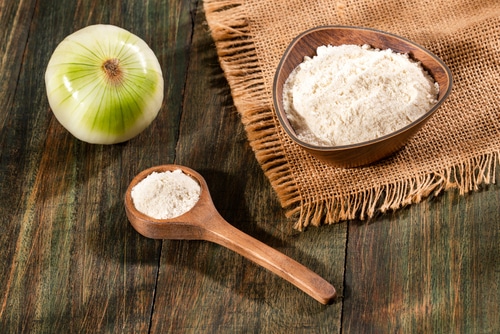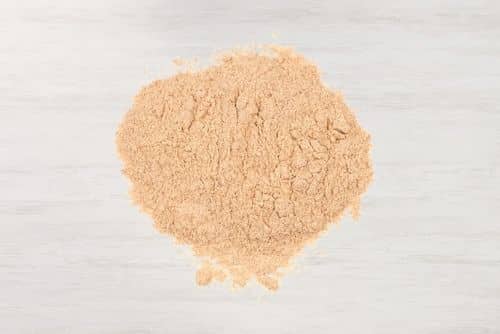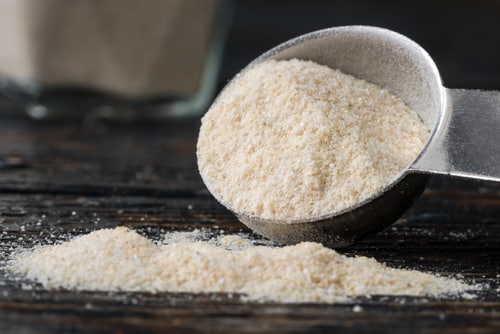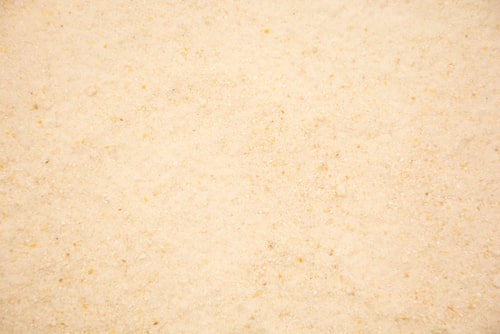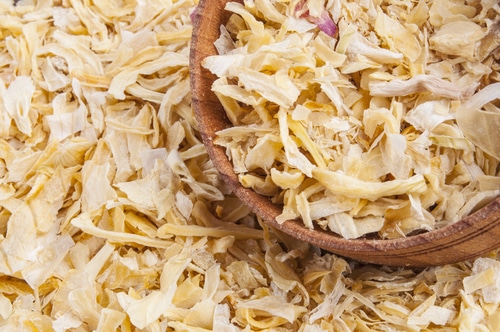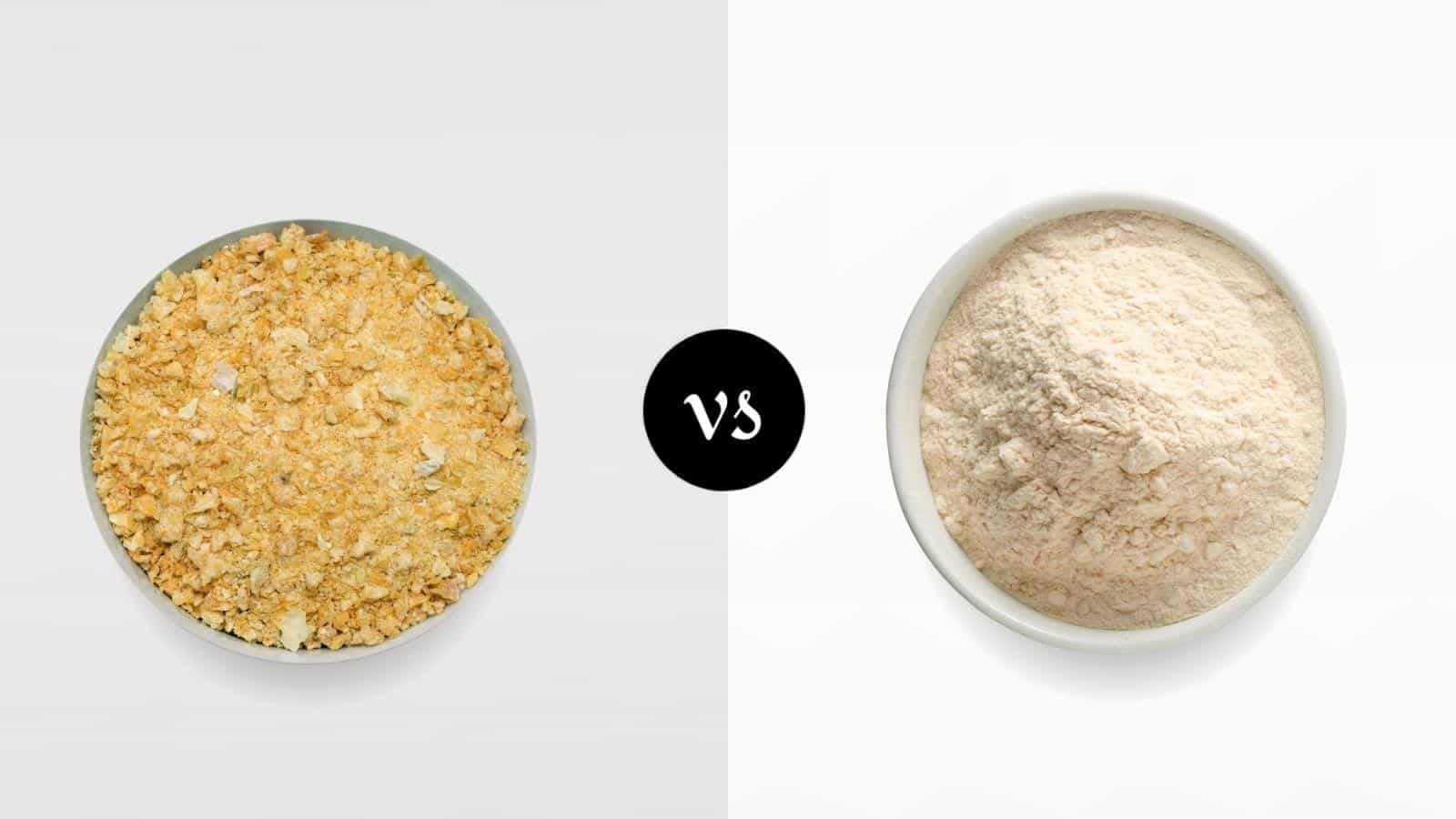
There may be many savory, flavorful vegetables but onions arise as one with the greatest nutritional value and health benefits. Onions add a flavor and rustic charm to any meal they’re added to
Some chefs will go as far as saying that they simply cannot cook a complete meal without using onion. Regardless of which type of onion you use, whether any variety of fresh, powdered, granulated, or pickled, the flavors will elevate your dish to the skies.
When it comes to onion granules vs. onion powder, most people find themselves confused over whether these two products are the same or not.
We’ll be taking you through a comprehensive comparison of onion granules and powdered onion. Even though they’re interchangeable, each is a unique ingredient with distinct benefits, and we’ve got everything you need to know coming up.
Onion Granules Vs. Onion Powder Comparison
| Definition | Onion Flakes Milled To Granular Texture - Dehydrated Onion Flesh Coarsely Processed | Powdered Dehydrated Onions Processed From Entire Onion To Flour-Like Consistency |
| Varieties | White, Yellow, Red | White, Yellow, Red |
| Ingredients | Dehydrated Chopped Onion Flesh | Dried Onion Including Flesh, Root & Skin, Anticaking Agents |
| Flavor | Bold Onion Flavor But Lighter Than Onion Powder, Doesn't Lose Flavor As Quick As Powder | Intense Onion Flavor That Dissipates Fairly Quickly Over Time |
| Uses | Rustic Cooking, Use When Texture & Flavor Is Needed, Used For Imparting Flavor Without Overpowering Onion Taste | Seasoning Spice, Flavor Enhancer For Savory Food |
| Texture | Coarse, Grain-Like Texture | Ultra-Fine, Flour-Like Powdery Consistency |
| Shelf Life | 5-Year Shelf Life, Long-Lasting Flavor | 3-4 Years |
| Availability | Limited Availability - Gourmet Ingredient | Available In Almost All Stores |
| Affordability | $2-$15 Per Ounce | 80 Cents-$3 Per Ounce |
| Substitutions | Onion Flakes, Onion Powder, Fresh Onion, Spring Onion | Onion Flakes, Onion Granules, Fresh Onion |
Onion Granules vs Onion Powder: What’s The Difference?
A kitchen that has both onion granules and onion powder is equipped to infuse tangy, sharp, sweet earthy flavor into any meal perfectly. Read on to learn how to use each ingredient optimally by discovering all the similarities and differences.
Onion Granules
The larger of our two ingredients, onion granules, is also the milder option. Don’t let this statement fool you – onion granules are packed with flavor. Let’s take a closer look.
What Are Onion Granules?
Onion granules are bits of onion flesh that have been roughly minced to a specific granular texture and then dehydrated to the point where their consistency resembles particles a little larger than sand.
Each onion granule is nothing more than a dried-out piece of onion dried to a specific point with a coarse texture and intensified flavor from the dehydration process. Essentially, onion granules are onion flakes that have been ground into particles.
Varieties
Onion granules are available in three basic varieties, namely white, yellow and red, just like onion powder. The color is determined by the type of raw onions used to create the flakes.
Ingredients
As a seasoning created from onion flakes which are dehydrated chopped onions, onion granules only contain onion. There are no additives needed.
Flavor
The taste of onion is stronger in onion granules than in freshly chopped onion, but it’s not quite as intense as onion powder. However, onion granules have the added benefit of not losing their flavor and aroma as quickly as powdered onion.
Depending on the freshness, onion granules can often end up tasting stronger than old onion powder.
Uses
Opt for onion granules when you’re looking for a rustic feel to your dish. They grant texture and flavor. Onion granules are ideal for dishes like meatballs, meatloaf, and textured sauces, soups, and gravies.
It’s excellent over roasted meat and vegetables and does a wonderful job of imparting sweetness without overpowering sharpness.
Texture
All onion granules will have a coarse, grain-like texture without any degree of powderiness. The particles are whole dehydrated pieces of onion flesh which ensures a rustic feel and grains resembling but roughly a third the size of rice or smaller.
Shelf Life
Up to five years of flavorful consumption can be expected from properly stored onion granules.
They outlast onion powder by a couple of years on average, and just like its counterpart, onion granules do not spoil but instead dissipate into a totally flavorless taste over time.
Availability
Onion granules are available around the world but are typically harder to find than onion powder. Not every supermarket or grocery store will stock onion granules, as many class it to be a gourmet ingredient.
Affordability
Most onion granule brands in the US retail for between $2 and $15 an ounce. Onion granules are at least twice as expensive as onion powder on average.
Substitutions
The top substitute for onion granules is onion flakes, followed by the bolder flavor offered by onion powder. Again, fresh onion is always an option if you don’t have either other variety available.
Spring onion or green onion harvested from young onion tops is another flavorful favorite that can be used as an alternative in a pinch.
Onion Powder
Some will find onion powder to be one of their favorite forms of seasoning. It’s a great spice for snacks and a must-have for certain rubs, marinades, meats, and cooking styles. Here’s a breakdown of onion powder and everything you need to know about it.
What Is Onion Powder?
Onion powder is a seasoning powder composed completely of powdered dehydrated onions.
While yellow and red onion powder is available as well as toasted varieties, most onion powder is simply dried white onions compressed to powder and packaged as seasoning.
Before dehydration, onions prepared for powder creation are minced to the exact same consistency to bring out balanced color and flavor.
Varieties
Standard white onion powder has a sharp flavor and is the boldest taste out of the four basic varieties. Red onion powder has a mild flavor, whereas yellow onion powder is sweet.
Toasted onion powder has a smoky flavor with nutty sweetness.
Ingredients
Any type of white, yellow, or red onions may be used in onion powder. It’s most common to find the most abundant variety of onions in your country used to make onion powder.
The entire onion, inclusive of the flesh, root, and skin, is dehydrated to make onion powder. Better quality brands will be free from additives, whereas mainstream onion powder typically features anticaking agents in addition to the powdered onion.
Flavor
Fresh onion powder tastes exactly like an onion with greater boldness of flavor. However, the longer the onion powder stands, the more flavor it loses.
Most onion powder carries a strong onion flavor with less sweetness and lower sharpness than fresh onion or onion granules.
Flavors are prominent, but the oniony aromatics dissipate faster and more than when using other varieties of onion.
Uses
The best way to use onion powder is as a seasoning spice over anything preferred. It is especially tasty on vegetables, eggs, and snacks like popcorn.
It is best to use an alternative if you are trying to replace onion as an ingredient in a dish as onion powder isn’t typically suited to being added in copious quantities as it only intensifies the taste to a limited degree.
Sprinkle onion powder over any savory food to lift its flavor and infuse the sharp, tangy, sweet bite of onion.
Texture
When fresh, onion powder will have a powdery flour-like consistency. Old onion powder begins to cake as it is affected by moisture but does not leave a grittiness to anything added once cooked.
Onion powder is quite hygroscopic, which means that the humidity in the air is clumped up and soaked up very rapidly. This is also why anticaking agents are often added to improve the consistency over a prolonged period.
Shelf Life
When stored properly in an airtight container kept in a humidity-controlled, cool space with zero exposure to light, onion powder will last for three to four years.
Onion powder does not spoil but rather loses flavor to the point where it’s pointless as an ingredient.
Availability
Between onion granules and onion powder, onion powder is the easier ingredient to find. It’s available in just about every grocery store around the world, with multiple brands offered in most cases.
Affordability
Onion powder is slightly cheaper than onion granules. The price range for onion powder in the USA ranges between 80 cents and $3 an ounce.
Substitutions
The best substitute for onion powder is onion flakes, but if onion flakes are not available, onion granules are your next best option. As a last resort, opt for fresh onion instead.
What Is The Difference Between Onion Granules Vs. Onion Powder?
The main difference between onion granules and onion powder is that onion granules are made from onion flakes utilizing onion flesh only that’s processed to rice-like particles.
Whereas onion powder is powdered onion from the whole plant, which is dehydrated and ground to a flour-like consistency. Onion powder is more intense than onion granules.
Which Is Best Between Onion Granules Vs. Onion Powder?
The better choice between onion granules vs. onion powder depends on how you plan to use the flavor and texture of onion. For a splash of bold flavor, onion powder is your best choice.
It’s also what you’ll be sprinkling directly onto food before eating it as seasoning. Onion granules need to be cooked and are too coarse for direct consumption for most people.
Certain recipes suit the intensity and consistency of each ingredient better. We hope our comparison helps you make the best choice for your next meal.
